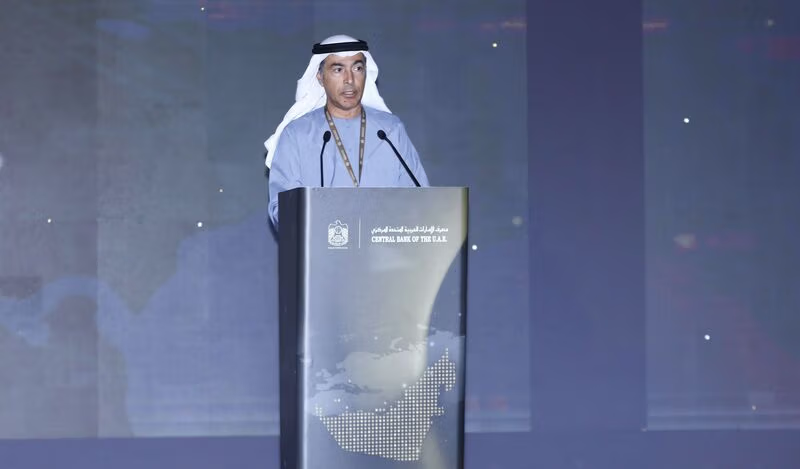Under the patronage of His Highness Sheikh Mansour bin Zayed Al Nahyan—Vice President, Deputy Prime Minister, Chairman of the Presidential Court, and Chairman of the Central Bank of the UAE’s (CBUAE) Board of Directors—Khaled Mohamed Balama, Governor of the CBUAE, officially opened the Middle East and North Africa Leaders’ Summit on Financial Inclusion today.
Hosted by the CBUAE over two days in Abu Dhabi, the summit is organised in collaboration with the Arab Monetary Fund and the World Bank.
The summit is being held for the first time in the UAE and was attended by AbdulAziz Abdullah Al Ghurair, Chairman of the UAE Banks Federation; Abdulrahman Al Saleh, Vice Chairman of the CBUAE Board of Directors; Younis Haji Al Khoori, Under-Secretary of the Ministry of Finance; and Ali Mohammed Bakheet Al Rumaithi, a member of CBUAE Board of Directors. Also present were Assistant Governors, senior officials from central banks and financial regulatory and supervisory authorities in the MENA region, and senior representatives from governmental entities, international and regional organisations, and financial institutions.
Held under the theme “Shaping Regional and Global Agendas,” the summit highlighted strategic priorities that support the development of inclusive, responsible, and sustainable financial systems, with discussions covering digital innovation, consumer protection, gender equality, and financial well-being.
In his opening remarks, Khaled Mohamed Balama affirmed the UAE’s commitment to promoting financial inclusion as a cornerstone for sustainable development and a pillar of financial resilience. “The UAE continues to consolidate its position as a global model of economic and financial innovation and inclusive development, guided by a forward-looking vision anchored in UAE Vision 2031 and the UAE Centennial 2071,” he said.
He added that advancing financial inclusion remains a central pillar in the CBUAE’s efforts to build a comprehensive, inclusive, and sustainable financial ecosystem, one that enables all segments of society to access growth opportunities and actively participate in the nation’s economic progress.
Day one of the summit featured the launch of several national and international financial inclusion initiatives, including the unveiling of the UAE National Financial Inclusion Strategy (NFIS) 2026–2030.
Developed by the CBUAE in cooperation with the World Bank, the OECD, and the Arab Monetary Fund—with input from over 70 national stakeholders—the NFIS provides a unified national framework to promote fair and secure access to financial services for every individual. It further reinforces the UAE’s leadership in fostering innovative, inclusive, and sustainable financial regulation at both regional and global levels.
The Governor highlighted that the NFIS is designed to serve all segments of society and is built around several key national priorities. These priorities include modernising the legislative environment that supports financial inclusion, accelerating digital transformation in the financial sector, strengthening financial literacy and well-being, and leveraging data and artificial intelligence to drive innovation, strategic policy-making, and the development of the National Financial Wellbeing Index.
Fatma Al Jabri, Assistant Governor for Financial Crimes, Market Conduct, and Consumer Protection at the CBUAE, noted that the NFIS aims to deliver a set of strategic goals by 2030. These include increasing the number of individuals with financial accounts, expanding the use of digital payment systems, and ensuring that financial innovation aligns with regulatory standards to enhance the resilience and sustainability of the financial sector.
The strategy includes 12 major initiatives to widen financial inclusion nationwide. These initiatives aim to guarantee universal access to financial accounts for all residents, design new products tailored for women, youth, and people of determination, and empower entrepreneurs and MSMEs by improving access to financial services.
The NFIS also introduces a national financial literacy programme and positions the UAE as a global centre for financial health, underscoring the country’s long-term commitment to a comprehensive and sustainable financial ecosystem. Additionally, it promotes strong governance and data-driven policymaking to ensure lasting impact and optimal use of financial resources at both national and international levels.
The opening day also featured keynote speeches from senior officials of the World Bank and the Arab Monetary Fund, as well as panel sessions on expanding financial access. Results of the regional “Findex” financial inclusion index for the Arab region were also released, providing policymakers with insights to improve inclusive, resilient, and sustainable financial systems.
The programme included dedicated sessions on financial health, including the announcement that the UAE will host Global Money Week in 2026. Additional sessions focused on women’s financial well-being, economic empowerment, and the promotion of financial literacy.
(Inputs from WAM)





